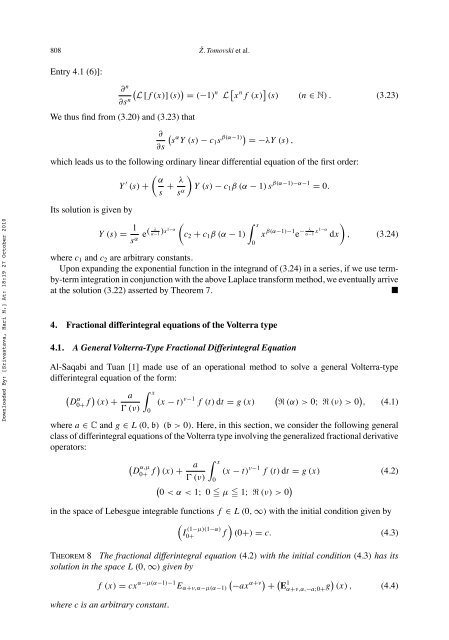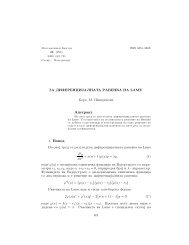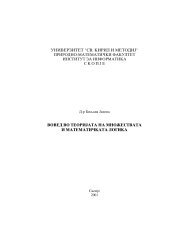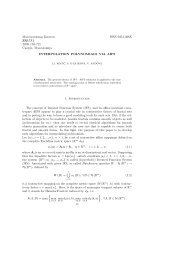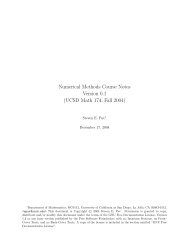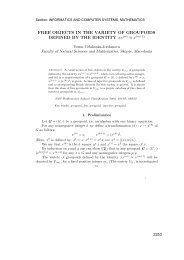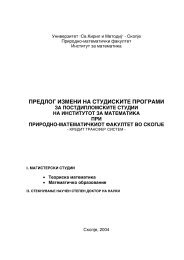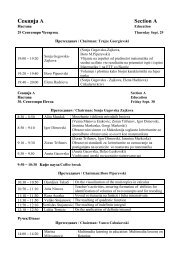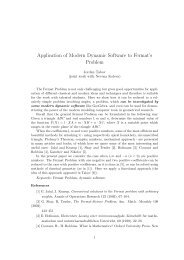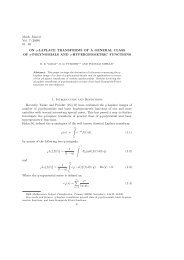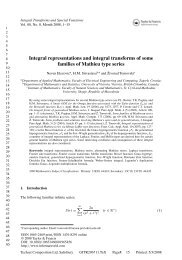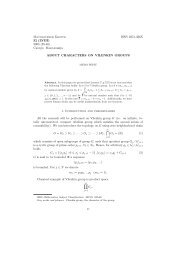Fractional and operational calculus with generalized fractional ...
Fractional and operational calculus with generalized fractional ...
Fractional and operational calculus with generalized fractional ...
Create successful ePaper yourself
Turn your PDF publications into a flip-book with our unique Google optimized e-Paper software.
808 Ž. Tomovski et al.<br />
Entry 4.1 (6)]:<br />
∂ n<br />
∂s n (<br />
L [f (x)] (s)<br />
)<br />
= (−1) n L [ x n f (x) ] (s) (n ∈ N) . (3.23)<br />
We thus find from (3.20) <strong>and</strong> (3.23) that<br />
∂ (<br />
s α Y (s) − c 1 s β(α−1)) =−λY (s) ,<br />
∂s<br />
which leads us to the following ordinary linear differential equation of the first order:<br />
( α<br />
Y ′ (s) +<br />
s + λ )<br />
Y (s) − c<br />
s α 1 β (α − 1) s β(α−1)−α−1 = 0.<br />
Downloaded By: [Srivastava, Hari M.] At: 18:19 27 October 2010<br />
Its solution is given by<br />
Y (s) = 1<br />
s α e( λ<br />
α−1)s 1−α (c 2 + c 1 β (α − 1)<br />
∫ s<br />
0<br />
)<br />
x β(α−1)−1 e − λ<br />
α−1 x1−α dx , (3.24)<br />
where c 1 <strong>and</strong> c 2 are arbitrary constants.<br />
Upon exp<strong>and</strong>ing the exponential function in the integr<strong>and</strong> of (3.24) in a series, if we use termby-term<br />
integration in conjunction <strong>with</strong> the above Laplace transform method, we eventually arrive<br />
at the solution (3.22) asserted by Theorem 7.<br />
<br />
4. <strong>Fractional</strong> differintegral equations of the Volterra type<br />
4.1. A General Volterra-Type <strong>Fractional</strong> Differintegral Equation<br />
Al-Saqabi <strong>and</strong> Tuan [1] made use of an <strong>operational</strong> method to solve a general Volterra-type<br />
differintegral equation of the form:<br />
(<br />
D<br />
α<br />
0+ f ) (x) + a<br />
Ɣ (ν)<br />
∫ x<br />
0<br />
(x − t) ν−1 f (t) dt = g (x)<br />
(<br />
R (α) > 0; R(ν) > 0<br />
)<br />
, (4.1)<br />
where a ∈ C <strong>and</strong> g ∈ L (0, b) (b > 0). Here, in this section, we consider the following general<br />
class of differintegral equations of the Volterra type involving the <strong>generalized</strong> <strong>fractional</strong> derivative<br />
operators:<br />
∫ x<br />
(<br />
α,µ D 0+ f ) (x) + a (x − t) ν−1 f (t) dt = g (x) (4.2)<br />
Ɣ (ν) 0<br />
( )<br />
0


